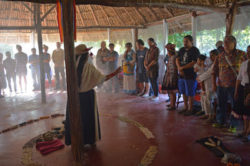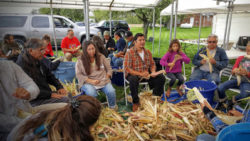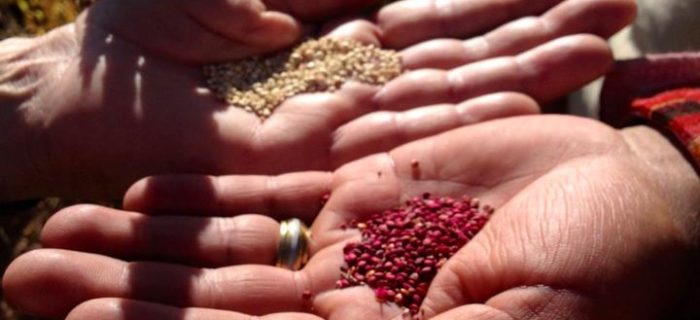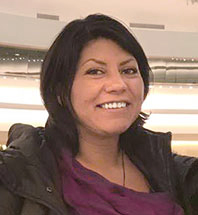Intervention on Strategies for Protection and Resurgence of Indigenous Agroecosystems
This post was originally published by Devon Peña at Environmental Food and Justice. The original presentation was presented in Spanish and then translated into English. Photos in this blog are courtesy of Alianza Milpa.
Moderator’s Note: We are posting the first of two new documents recently presented to the 17th Session of the United Nations Permanent Forum on Indigenous Issues (UNPFII) which convened 16-27 April 2018 at United Nations Headquarters in New York City. The theme focused on “Indigenous peoples’ collective rights to lands, territories and resources.” The first intervention was delivered in person during session by Berenice Sánchez, an indigenous Nahua-Hña Hñu (Otomi) woman from the state of Mexico, Mexico, who works to defend the rights of indigenous peoples. She has participated in, presented, and organized tens of conferences, as well as national, regional, and international workshops.
The intervention focuses on the strategies the UN should adopt to more effectively and proactively protect and promote traditional indigenous agroecosystems that have emerged over millennia in the major centers of origin and diversification of crops like maize, beans, squash, chile, and many more.
Berenice Sánchez for Alianza Milpa, Asociación Andes, Land is Life, Instituto Acequia, Agricultores Indígenas de Maíz:
Thank you Mr. President.
The indigenous peoples over millennia have developed food systems based on understanding and respecting the  bioregulation cycles of life on the planet, accumulating and transmitting knowledge and practices that have been key in the conservation of the ecosystems of our territories. We think of ourselves as guardians of the seeds that we inherited from our ancestors and whose cultivation, improvement and adaptation to different ecological levels have made up the centers of origin and diversification routes of food that have not only nourished our bodies; they also constitute our Good Living. The systems of conservation and exploitation of the biological diversity of our territories make tangible our sacred responsibility to maintain the balance of the cycles that make possible the existence of every living being. Generation after generation we have assumed the commitment to protect and transmit the original instructions to preserve not only the life of the human being on the face of the Earth but the very Life of Our Mother Earth. If in truth there is a genuine interest in changing the seemingly irremediable destiny to which the planet is being driven, we must then learn from the ways of life of the indigenous peoples of the world.
bioregulation cycles of life on the planet, accumulating and transmitting knowledge and practices that have been key in the conservation of the ecosystems of our territories. We think of ourselves as guardians of the seeds that we inherited from our ancestors and whose cultivation, improvement and adaptation to different ecological levels have made up the centers of origin and diversification routes of food that have not only nourished our bodies; they also constitute our Good Living. The systems of conservation and exploitation of the biological diversity of our territories make tangible our sacred responsibility to maintain the balance of the cycles that make possible the existence of every living being. Generation after generation we have assumed the commitment to protect and transmit the original instructions to preserve not only the life of the human being on the face of the Earth but the very Life of Our Mother Earth. If in truth there is a genuine interest in changing the seemingly irremediable destiny to which the planet is being driven, we must then learn from the ways of life of the indigenous peoples of the world.
Stay in the loop with Food First!
Get our independent analysis, research, and other publications you care about to your inbox for free!
Sign up today!Our traditional food systems are not only models to combat hunger and poverty, but also a way to achieve the Sustainable Development Goals, since they are closely linked to our territorial rights, our caring for water and our raising of seeds, and the transmission of our traditional knowledge and cannot be separated from our right to Self-Determination. However, the system of economic development driven since the colonization has accumulated wealth and financial capital from the dispossession and plundering of our territories, advancing on each element of life, reifying and commodifying everything that lays upon and underlies our territories, impoverishing and violating our rights systematically. Globalization advocates overwhelm our territories by imposing death projects that end our forests and jungles and that advance over deserts and seas, criminalizing, imprisoning, assassinating or disappearing those who dare to defend Life.
Industrial agriculture, with its genetically engineered seeds, or ready for the weather and chemical synthesis pesticides, exemplifies the structural failures of this economic system that has resulted in a global food crisis in which 70% of arable land is under a model of production that only feeds 30% of humanity. However, traditional food systems, despite controlling only 30% of cultivated land, have demonstrated their ability to feed 70% of humanity on the planet while maintaining ecosystems in balance. Thus, we can affirm that when there are healthy traditional agri-food systems there is neither hunger nor poverty.
We present ourselves as Indigenous Peoples of Maize, a sacred seed that not only feeds our bodies, but is the basis of our identity, culture, cosmovision, spirituality and food sovereignty. In the continuity of its cultivation is guaranteed the maintenance of the associated diversity that includes wild and cultivated species adapted to different climatic and soil conditions, without genetic modification being involved in obtaining these goals.
Recommendations:

In this regard, we respectfully suggest that it is essential that the Permanent Forum promote the creation of an interagency framework in the United Nations system that truly assumes the biodiversity conservation commitments established in the CBD, as well as the Sustainable Development Goals, through the recognition and respect of indigenous peoples as subjects of collective rights and key actors in the configuration of policies on the conservation of biodiversity, ecosystems, and environmental resources.
We also recommend that it catalyze the creation of a fund dedicated to strengthening and reconstituting traditional agri-food systems, guaranteeing the full and effective participation of indigenous peoples in their design, operation, evaluation, and monitoring. This fund must promote and promote the raising of native water and seeds, prevent contamination with transgenic seeds, remediate the health of indigenous peoples contaminated with pesticides, and prevent genetic erosion.
Finally, Mr. President, we maintain that if we do not act responsibly and become aware of the planetary damage caused by the current development model and continue to perpetuate the same dynamics of accumulation of wealth, arguing this will lead the false idea of the generation of decent jobs for the poor, our Life on the Planet as we know it will continue to be destroyed, approaching us vertiginously to a point of no return.



 Help Food First to continue growing an informed, transformative, and flourishing food movement.
Help Food First to continue growing an informed, transformative, and flourishing food movement.




